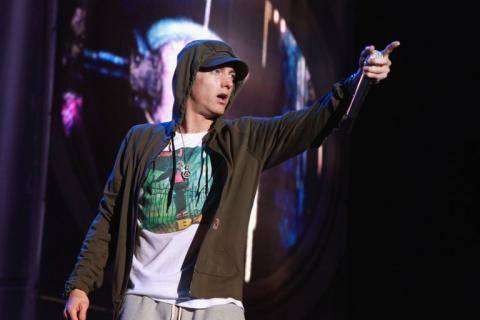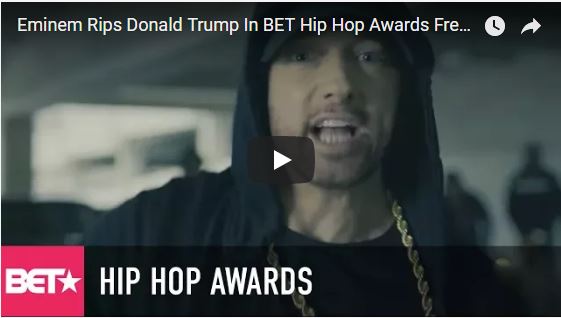Eminem is far from the first rapper to trash the current American president.
The most explicit attack came in August from the California rapper YG. His song “FDT” — the title is an abbreviation whose meaning can’t be spelled out in a family newspaper — calls President Trump a “cancer” and insists: “He can’t make decisions for this country, he gon’ crash us/No, we can’t be a slave for him.”
Kendrick Lamar took aim at the president in March in “The Heart Part 4,” with the lyrics:
Donald Trump is a chump, know how we feel, punk
Tell ’em that God comin’
And Russia need a replay button, y’all up to somethin’
Electorial votes look like memorial votes
But America’s truth ain’t ignorin’ the votes.
And the young rapper Aminé used his television debut on “The Tonight Show With Jimmy Fallon” back in November to deliver these lines: “9/11, a day that we never forgettin’/11/9, a day that we always regrettin’.”
Then there are scores of implicitly anti-Trump songs that take on issues like police brutality and economic inequality, like Chance the Rapper’s latest, which he performed late last month on “The Late Show With Stephen Colbert”: “And y’all just keep clappin’ and keep happen/Like Flint got clean water and y’all don’t got teen daughters and black friends and gay cousins, y’all just gon’ say nothin’.”
Yet Eminem’s “The Storm,” a scathing four-minute attack on the “kamikaze that will probably cause a nuclear holocaust,” which he debuted at the BET Awards on Tuesday night, has already overshadowed all of these previous anti-Trump musical efforts. It’s made major news headlines. It’s already garnered 8.7 million views on YouTube. And there have been some two million tweets about the performance, with praise pouring in from stars including LeBron James and Ellen DeGeneres.
What gives? Some see the overwhelming reaction to the rap as evidence of racism — that Eminem’s song is generating such overwhelming attention because he’s white. There’s no denying that the key difference between the rappers mentioned above and Eminem isn’t that he’s the only one from Detroit.
The fact of Eminem’s whiteness, though, also means that he reaches a different listener. A recent Times article that looked at music fandom across the country noted that his base is “strongest in whiter and more rural places: West Virginia; southern Ohio; eastern Kentucky; deep north Maine; the Ozarks in Missouri; across the Great Plains.”
When Kendrick Lamar blasts Mr. Trump, he is preaching to the choir. When Eminem does it, there’s a good chance Trump voters are actually listening.
In 1990, Michael Jordan refused to endorse a North Carolina Democratic candidate on the grounds that “Republicans buy sneakers, too.” Many have suggested that this logic muffles pop stars like Taylor Swift, who was mum during the presidential election and whose silence persists.
Eminem knows that Republicans buy songs — his songs — too. His message to them is to stop buying. After focusing on the evils of the “racist 94-year-old grandpa” in the White House, he gives his Trump-supporting fans an ultimatum. “I’m drawing in the sand a line: you’re either for or against,” he says. “And if you can’t decide who you like more and you’re split/On who you should stand beside, I’ll do it for you with this,” he adds, giving his middle finger to the camera.
Those fans heard him loud and clear. Many vowed to never listen to his music again.
Eminem isn’t the first entertainer to part ways with his conservative fans. In 2003, the chart-topping Dixie Chicks criticized George W. Bush at a concert: The band’s lead singer Natalie Maines said they were “ashamed the president of the United States is from Texas.” They got crushed for it — their No. 1 single at the time fell off the charts. Their experience served as a cautionary tale for other liberal country stars, but it’s a message that apparently didn’t reach Eminem.
Or did it? While the Dixie Chicks aren’t exactly superstars, they’ve built a solid new fan base with politically tinged concerts — in June, the group performed in front of a giant image of Mr. Trump defaced to look like a devil with horns and a goatee. A cynic might say that Eminem, who is reported to be coming out with a new album next month, is following a similar playbook.
Then again, maybe it’s cynical of us to attribute cynicism to Eminem. Anyone who cares about this country has a right to speak his mind and rappers with huge followings have a platform to change the minds of others. As Eminem puts it in the very last lines of “The Storm”: “The rest of America stand up/We love our military, and we love our country” but we “hate Trump.”
Bari Weiss (@bariweiss) is a staff editor and writer in The Times Opinion section.



Spread the word